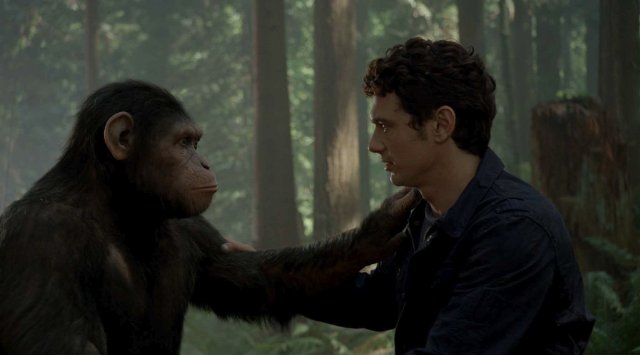I've seen Planet of the Apes (2001) and never did like it. I thought the plot was a bit nerve-racking, but otherwise unsubstantial. I never did like the thought of seeing animals behave like humans and humans treated like animals. The story really got me lost because it was like a screenplay of a horrific over-lunch discussion ideas.
Anyway, so after 10 years.. seems the first story about apes stirred a couple of new thoughts about creating the missing piece of that old movie. This new one, Rise of the Planet of the Apes, had its setting in current times. In the midst of science, and modern living, scientists experiment on animals closest to human genetics--apes, to try and solve human diseases.
Its true that since we've been more civilized, it seems we have relied less and less on our brains. This in turn has been causing our brain cells to deteriorate. We become very dependent on machines and gadgets to provide us with information--which has largely become volatile in our heads.
James Franco as Will Rodman, was a genetic engineer who was uncovering a cure for Alzheimer's disease which plagued his own father. Working for a big laboratory, GenSys, gets their ape subjects from the nearest forest just opposite the Golden Gate Bridge. At the height of his research and experiment, he found that the medicine actually boosted the intelligence of these primates, only with the expense of having their eyes' retina grow to a greenish-yellow color. The next step was to actually try it to a human subject. Unfortunately, "bright eyes", his successful ape subject exhibited a very aggressive behavior and was taken down by security.
Having lost his break, they found that "bright eyes" had a son. She seemed aggressive only because she was being protective of her offspring. Caesar, the offspring was brought home and nurtured by Will. As he grew, he showed signs of great intellect and fast learning. But of course, who could keep an ape inside his house for so long without being noticed? Soon after, Caesar learned violence by defending Will's father in a neighborhood quarrel. This was the start of Caesar's bitter reality. After being taken away by animal shelter, he was introduced to animal torture and other monkeys as well. He loses faith in his "human" and plots an escape to live in his concept of freedom and home.
I think that the movie was quite interesting. Aside from the fact that I did not make extra effort to research its plot, which provided me with the suspense that I wanted. Every minute, I continued to be fascinated with the story. I was waiting for things to unfold. I particularly felt in sympathy with the pack of apes when they were disbanded by GenSys to harvest test subjects. I was in sync with how Will felt closely attached to the success of his project, the same way I was amused by the presence of Caesar in their house.

After Caesar first demonstrated violence, he started to look very creepy to me. The movie has successfully instilled the horror in me that this huge primate was a 100% capable of hurting humans. When he was detained in animal shelter, he continuously built up a horrible character of strength and intelligence. He was able to kill a human, lead an escape battle against policemen, and was able to speak!
The horror never left me until the part that this particular virus discovered was found to be harmful to men. It started a viral disease that was highly fatal. In the end, the movie leaves you to thinking, will man survive the virus that makes apes thrive in extreme intelligence? Will this put the apes at the top of evolution? What, if ever, will they evolve to?
If this movie was ever intended to be the prologue of Planet of the Apes (2001), truly it was the better story.
